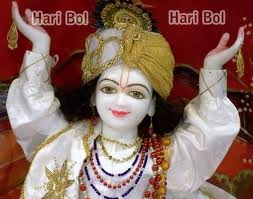God is Waiting for Us
(continued)
Attainment of that existent and real essence (sat-tattva) is not by doing something (some activity). The reason is that all activity takes place in the unreal and perishable, where-as "sat tattva" is realized from renouncing the "asat" (unreal, perishable). When desires come to an end, the unreal is also renounced and when the thirst for acquiring the real (sat tattva) is awakened in the present, the past is not recollected, and future expectations come to an end. The thirst for the real (sat tattva), erases all desires and makes one realize the real, the Truth (sat tattva).
That which we call worldly pleasures is as such the fatigue of the mind. The pleasures derived due to the fatigue of the mind will come to an end, but the spiritual bliss does not end. That bliss is our true nature (swaroop). The fatigue of the mind is not our real self.
When all worldly infatuations deriving pleasure come to an end, then one experiences eternal joy, that cannot be described. "yam labdhvaa chaaparam laabham manyate naadhikam tatah." (Gita 6/22). On experiencing the eternal joy, all desires come to an end, and there is nothing lacking whatsoever. "Rasavarjam rasopyasya param drushtvaa nivartate" (Gita 2/59)
When all worldly infatuations deriving pleasure come to an end, then one experiences eternal joy, that cannot be described. "yam labdhvaa chaaparam laabham manyate naadhikam tatah." (Gita 6/22). On experiencing the eternal joy, all desires come to an end, and there is nothing lacking whatsoever. "Rasavarjam rasopyasya param drushtvaa nivartate" (Gita 2/59)
If man wants to be saved from sorrow, then he should give up wishing for pleasure and enjoyment. If he wants to be saved from disease, then he must give up wanting sense pleasures. If he wants to be saved from dishonor, then he must give up wanting honor. If he wants to be saved from mourning, then he must wipe out wanting exhilaration. The point is that we our selves have constructed this sorrow, this pain and suffering. Without our will, no one can make us unhappy or dependent.
There is one note-worthy and touching point and that is, whatever are the essential needs of a man, the potential to attain it is already present in him. The point is that whatever a man is capable of doing, with that alone his essential needs can be met. The world also expects from a man, what he is capable of doing or delivering. God also gives the same command, with reference to what a man can do. If a man can do something, but is not doing it, it is regarded as undutiful "akartavya". As long as man's real need is not fulfilled, till then his act of doing does not come to an end, he will continue to do something or the other. The reason is that "to do" is a discipline, it is not the goal (God). On attaining the goal, the rest of the spiritual practices do not remain, in other words, when residual needs do not remain, the act of doing also does not remain, man becomes krutya-krutya, i.e. he reaches a state where nothing remains to be done.
God's infinite power is constantly pulling all beings towards Him. Therefore no situation remains permanent. Man's attachment too does not remain permanent anywhere. There is constant falling out of relationships with every object and person. This infinite power of the Supreme Spirit (Paramatma) is neither ruling over men, not is it taking away their independence and making them dependent. It is a principle that in the end an object merges back into that thing alone from which it was created, thereafter there is completeness (fulfilment). Jeev (being) has separated from Supreme Spirit (Paramatma), therefore until it does not merge into Paramatma, till then Jeev will continue to wander endlessly and fulfilment will not come about. Therefore leaving Paramatma, and getting trapped in sense of Mineness and desire for things, individuals, actions, states, situations etc., is useless. Making an effort to acquire those things is useless effort. Jeev's (embodied soul's) natural end will be to merge in Paramatma (Supreme Spirit) alone. When Jeev distances itself from its natural state, and turns toward various things, individuals, then God's grace causes a separation from those things, individuals etc. It is a principle that as long as Jeev does not unite with Paramatma, till then all unions will have a separation. The changes that are happening in the world are teaching Jeev that do not get trapped in the world. The world is not Jeev's aim (goal). Jeev's aim (goal) is Paramatma, That is waiting for the "Jeev" at all times.
Narayana ! Narayana !! Narayana !!!
From "Sant Samaagam" in Hindi by Swami Ramsukhdasji
If in doubt regarding the translation, please read the original Hindi message by Swamiji.
FOR MESSAGE IN HINDI PLEASE VISIT Date : 17th January, 2012 "BHAGWAAN HAMAARI PRATIKSHAA KAR RAHE HAI"
http://www.satcharcha.blogspot.com/
